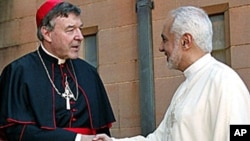A young imam and a rabbi have joined forces in Australia to create a multi-faith organization to promote religious tolerance and understanding in schools. The Together for Humanity program aims to dispel misconceptions about Muslims and Jews in a predominantly Christian country.
More than 50,000 Australian school children have taken part in the Together for Humanity program, a multi-faith non-profit organization.
Its message is simple: workshops on religion and race aim to dispel myths and stereotypes at a time when minority groups face suspicion and mistrust.
Australia's 300,000-strong Muslim community has often complained of discrimination since the 2001 attacks in the United States, and the Bali bombings a year later. And synagogues have also been attacked in recent years.
Together for Humanity leader Sheikh Haisam Farache is one of a small number of Australian-born imams. He works at the country's biggest mosque in Sydney.
He is keen to open students' minds to Islam and Judaism. "A lot of schools that we go to, we ask the question 'Has anyone ever met a Muslim before? Has anyone ever met a Jew before?' And the majority will say no,' Farache said.
Sheikh Farache has forged a strong friendship with the head of the Together for Humanity group, Zalman Kastel, a U.S.-born rabbi, who was raised in an Orthodox Jewish community in New York.
Rabbi Kastel says the pair's friendship has helped make the project a success. "I think the kids can sense that we actually know each other well and respect each other and like each other", he says, "I think for the kids, in some ways that's the most powerful thing we can say, it's just by being there."
Researchers are collecting data to quantify changes in students' attitudes toward people of different races and religions. The project's leaders say early signs are good.
The team has developed an online teaching manual, and hopes to spread its message of tolerance to all schools across Australia.
A quarter of the country's population was born overseas, but Australia's multicultural flavor has in the past been tainted by pockets of racism and religious bigotry.
Imam, Rabbi Confront Religious Stereotypes in Australia





